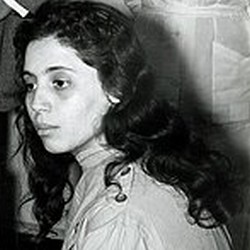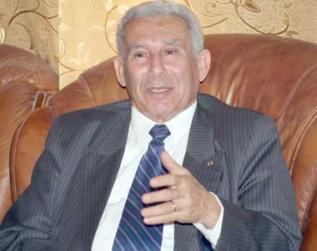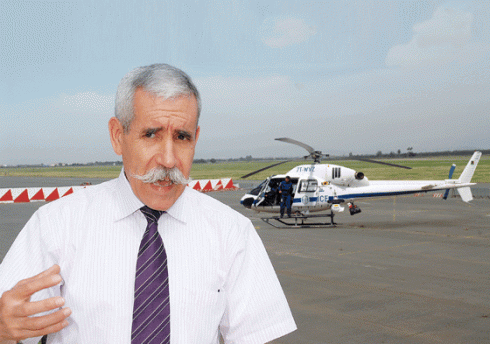You are currently browsing the tag archive for the ‘Bouteflika’ tag.
What to make of Ali Tounsi’s assassination? In keeping with their tradition of misunderstanding Algeria’s politics, several western news outlets are either overstating or misunderstanding the impact of this event, e.g with regards to the fight on terrorism and the causes of the murder.
The abnormal about Ali Tounsi’s assassination is that it appears to be normal so far. Assassinations are always suspicious in Algerian circles: Mohamed Boudiaf, Abdelhaq Benhamouda, Matoub Lounes, and countless other deaths have been shrouded in mystery and conspiracy theories for good reason and with good evidence.
Ali Tounsi, though (pictured right), got gunned down by a trusted colleague, Lt Colonel Oultache Chouaib (pictured below), who he knew for years. Tounsi apparently pleaded for Oultache to return from retirement and head the new aerial police force a few years ago. Tounsi wanted to clamp down on corruption and identified Oultache as one of the corrupt, dismissing him a day before the assassination as reported by Ennahar. An easy explanation is that Oultache went berserk as he could not comprehend how Tounsi returned him to the force only to send him to the prison cell. So he shot the guy after a verbal confrontation.
Reports conflict as to what happened afterwards. Several newspaper websites fluctuated between various stories: first claiming that Tounsi himself shot him (unlikely), then there were reports that Oultache asked the secretary to invite other high ranking officers in an attempt to cause a ‘bloodbath’, but he got shot by a third unknown person. Finally they rested on the story that the perpetrator shot his chest trying to commit suicide. These conflicting accounts are still described in Echorouk’s main story. These variations are unsettling. I really want to believe that Oultache acted alone: after all his dismissal story is real.
All of this is happening in a background that is not reassuring. Rumours are rampant about a power struggle between the DRS (the security service) headed by the last bastions of the Algerian army and Bouteflika. In the run up to Bouteflika’s third term, in an effort to concentrate power in the presidency, he was successful in neutralising several key figures of the army who have been in power behind the scene for years. The list includes Mohamed Lamari and Larbi Belkheir (who died a month ago). Bouteflika knew that nothing could stop the momentum to claim a third term, and his power has been worrying the intelligence service. Bouteflika’s popularity soured as the country got turned intro a construction site for multi billion dollar projects, such as the promised million apartments and the enormous east-west highway project.
So it was no surprise to many that the army and the DRS turned the tables on the civilian government and the corruption charges by taking the fight to the government itself using the same charges: several figures of the ministry of construction were arrested in 2009, and the CEO of Sontrach (the state oil company) got arrested along with several other people in the company . The investigations are reportedly being unusually carried by the DRS itself.
Ali Tounsi is usually thought to be firmly in the DRS camp. He was in the service for several years, most recently under its current head. I really want to believe that nothing is going on with his death, I’m literally trembling over the possibility of a power fight that would have spilled to this level. There is an uneasy silence in Algeria at the moment and the societal front is heated up with weekly reports of riots, Harga (illegal immigration) and continuing strikes in the education sector.
On the assassination, nothing much is known about Oultache Chouaib. I dug up the picture above by searching through Google’s archives of the police website. He is quoted in a Microsoft Vista study (watch as it will evaporate) touting Microsoft solutions for the 120000 man strong police force. It has been reported that he was a trusted colleague of Tounsi.
Ali Tounsi, the Police Force and Terrorism
Ali Tounsi garnered a reputation as a disciplinarian and won the admiration of a lots of Algerians as a strict Kheddam (serious worker). Indeed, as the police force got expanded over the last decade many Algerians saw it as a convenient employer to escape rampant unemployment, especially amongst the youth, so people looked up to him and his force as a potential source of Khoubza (bread – income).
Tounsi vowed to match the policemen/population ratio of western countries. He sought to enforce professional standards, revamping uniforms and sending out communiqués that enforce discipline in dealing with the public. He famously lashed out at policemen who were not using their shiny new white gloves. Several policemen friends attest to how he is universally respected and feared in police academies – trainee policemen train for months to produce the perfect march at graduation. He wanted to restore the reputation of the police as a lawful force in contrast to the tarnished Gendarmerie and Army. He wanted the police to strictly adhere to laws requiring judicial oversight over arrests and home raids.
Tounsi’s murder though will have virtually no impact on the fight on terrorism. During the civil war, the police had a key if secondary role in fighting terrorism (many terrorists initially regarded police as illegitimate targets). The fight has been shouldered by the army and the Gendarmerie, a French style highly mobile force that operates both in civilian centres as well as rural areas where they excel. In recent years, as terrorists confined themselves to the mountains the army took most of the responsibility , with the intelligence service reportedly looking to untangle the civilian cells after the recent bombings in Algiers. Most importantly, the police is a huge force, the head will be replaced quickly and normal operations will resume without much interruption.
Ali Tounsi’s death is only going to bolster his image as a martyr. The country’s biggest problem now is rampant corruption, and the official story is that the murderer was about to get convicted of corruption. The war on corruption in the country continues to take unexpected turns every few months.
Update: Also read Kal’s post on the murder.
 The re-entrance of an iconic figure from the Algerian revolution into Algerian politics has always sent shock waves through the whole society. The latest entrant is Djamila Bouhired, one of the most recognised faces of the revolution worldwide. The manner in which she shot back into the political arena commands further analysis than the typical response that has been written, and is still being written in various Algerian and Arab outlets.
The re-entrance of an iconic figure from the Algerian revolution into Algerian politics has always sent shock waves through the whole society. The latest entrant is Djamila Bouhired, one of the most recognised faces of the revolution worldwide. The manner in which she shot back into the political arena commands further analysis than the typical response that has been written, and is still being written in various Algerian and Arab outlets.
Very few living people in Algeria still command the same respect as Djamila Bouhired as a revolution figure. The revolution is sacred, and so are the people who participated in it – but only those who passed away during the revolution or stayed on the touchline after the independence. After 1962, the men and women of the revolution chose or were forced into three different paths. The first group took control of the country in a single party rule and dived in its wealth, sharing it with those who turned out to be opportunists. The second group voiced their discontent about the direction that the new state was taking, and were all forced into exile or were mysteriously assassinated. The third group chose to keep quiet, living on the sidelines, content with being remembered every year on the national day and being given a token state recognition every now and then. Djamila has been one of these until two weeks ago, when she chose to step back into the field, and what a step it was.
Djamila sent two letters to the most popular Arabic and French newspapers, Echorouk and ElWatan. The first is mainly pro-state and the second is firmly in the opposition camp. But that doesn’t matter, the goal was to reach the largest audience. The letters voices her personal hardship and her discontent with the way she has been mistreated along with war veterans. But Djamila’s aim is not to merely voice her unhappiness, it seems to be an effort to embarrass the current government in general, and the current president, Bouteflika, in particular. The letters were addressed in his name.
Like most veterans, Djamila is drawn a remuneration that is modest to good by Algerian standards. Djamila was given an apartment in ElMouradia, one of the wealthiest neighbourhoods in the country and the site for the Presidential palace itself. She has been assigned a maid to help her in the apartment. The remuneration money would not be able to cover for the typical private health costs of her age, so her claim is legitimate. Djamila could have contacted one of the many veterans organisations in the country, and they would have scrambled to help her. But the Ministry of Mudjahideen (veterans) and the Organisation of Martyrs both claimed that Djamila never contacted them directly about her hardship.
 Djamila must know the status that she holds with Algerians and Arabs all over the world. She was depicted in both La Battaile D’Alger and the Egyptian blockbuster “Djamila”, both films that thrilled the international and Arab audiences respectively. She has always been a symbol of feminine activity in largely men dominated Arab societies. Her letters caused an outcry in Algerian circles to the huge embarrassment of the state. The Arab press roamed free to criticise the Algerian government’s carelessness, with much of the criticism coming from Egyptian circles (ongoing football row). The blow was with such force that the government could not even issue a statement or apologise, instead there are reports of efforts to appease her with better Villas and a potential position in the cabinet or one of the veteran organisations.
Djamila must know the status that she holds with Algerians and Arabs all over the world. She was depicted in both La Battaile D’Alger and the Egyptian blockbuster “Djamila”, both films that thrilled the international and Arab audiences respectively. She has always been a symbol of feminine activity in largely men dominated Arab societies. Her letters caused an outcry in Algerian circles to the huge embarrassment of the state. The Arab press roamed free to criticise the Algerian government’s carelessness, with much of the criticism coming from Egyptian circles (ongoing football row). The blow was with such force that the government could not even issue a statement or apologise, instead there are reports of efforts to appease her with better Villas and a potential position in the cabinet or one of the veteran organisations.
 Her move signals that she is foremost deeply unhappy with Bouteflika, who, just a few months ago, held her hands as he paraded her to an audience of foreign personalities and diplomats during the yearly independence celebrations. The feud could be personal: Bouteflika enjoyed the legacy of the revolution to the fullest: he became foreign minister at the age of 27, having served for only the last few years of the revolution. His return was orchestrated using his revolution and Boumediènian credits, and he used that to concentrate power more than ever before into the presidency and seek a third presidential term.
Her move signals that she is foremost deeply unhappy with Bouteflika, who, just a few months ago, held her hands as he paraded her to an audience of foreign personalities and diplomats during the yearly independence celebrations. The feud could be personal: Bouteflika enjoyed the legacy of the revolution to the fullest: he became foreign minister at the age of 27, having served for only the last few years of the revolution. His return was orchestrated using his revolution and Boumediènian credits, and he used that to concentrate power more than ever before into the presidency and seek a third presidential term.
It would not be a surprise if Djamila’s move was encouraged by a circle of veterans, many of whom may still be powerful figures in the Algerian army. It has for long been known that there is a great power struggle between Bouteflika and some Army sections that are unhappy with the way he has been stripping them from power. The struggle manifested itself more openly in Benflis’s attempt at unseating Bouteflika in the presidential elections of 2004 and the ensuing internal struggle within the FLN. Djamila’s letters may not necessarily suggest an evil motive as she may simply be unhappy with the way Bouteflika and his henchmen have been benefiting from the country’s wealth while ignoring the plight of countless veterans.
Djamila’s cry sheds further light on the colossal mismanagement of the veterans issue. Veterans of the revolution enjoy quite a range of benefits that are a point of envy, greed and controversy for Algerians. In addition to the remuneration, veterans can import certain goods without tax and often get priority when houses and apartments are allocated by the state. In many eyes, the veteran system has become a vehicle of corruption where opportunists and corrupt officials use dubious revolution credits to maximise their wealth. Algeria is often quipped to be the only country whose number of veterans increases over time. In 2006 there was a great debacle at the claim that up to 50000 registered veterans are not only false veterans, but were actively fighting against the revolution.
The veteran system has become to be seen as a vehicle with which power hungry officials claim credence. It represents the failed legacy of the revolution in many Algerians’ eyes. The revolution captivated the people’s minds and set the Algerians hopes high with visions of freedom and development. But now the agony of the disappointment over its legacy can be seen in many writings and events , such as Ahlam Mosteghanmi’s trilogy, the illegal immigration problem (Harga) and now Djamila’s letters. Djamila’s complaint is, in the end, a continuation of this collective mourning.




Recent Comments